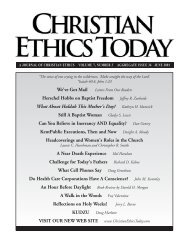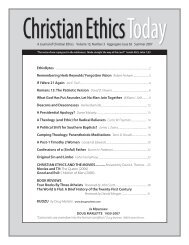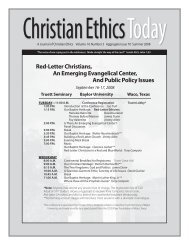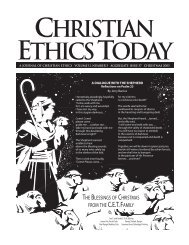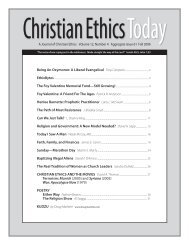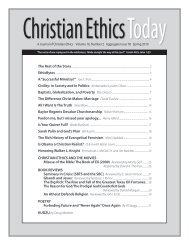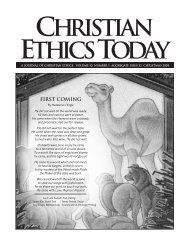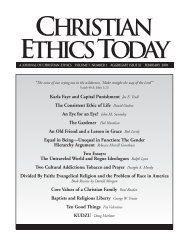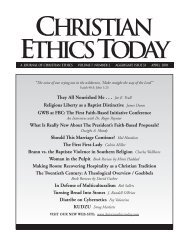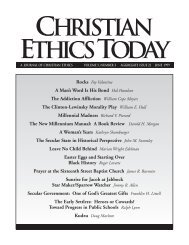Issue 048 PDF Version - Christian Ethics Today
Issue 048 PDF Version - Christian Ethics Today
Issue 048 PDF Version - Christian Ethics Today
Create successful ePaper yourself
Turn your PDF publications into a flip-book with our unique Google optimized e-Paper software.
God’s indifference. Jeremiah repeatedly asks “Why?” “Why<br />
has the way of the wicked prospered” (12:1)? “Why is my<br />
pain unceasing” (15:18)? “Why did I ever come forth from<br />
the womb” (20:18)? These questions are never answered and<br />
God seems inattentive to their seriousness; but they suggest<br />
that Jeremiah is now working without a net. He himself had<br />
warned of the cosmic consequences of Israel’s refusal to<br />
embrace the ways of the Creator. “I looked on the earth and<br />
it was formless and void” (4:23). Things do fall apart when<br />
the Center does not hold. And now Jeremiah’s own center<br />
has been shaken. Lament, however, provides a means for<br />
finding formfulness in the context of formlessness. 29<br />
Walter Brueggemann helps us understand the significance<br />
of having available the lament form for expressing grief.<br />
With the possibility of prayer that includes complaint, petition,<br />
and expression of trust there is a means for voicing how<br />
a prior perception of reality, one’s basic orientation, has been<br />
displaced (complaint), how in a situation of disorientation<br />
God must be at work (petition), and how there is anticipated<br />
the gift of a new world in place of what has been lost (expression<br />
of trust). 30 Brueggemann argues that use of the lament<br />
form is vital in the experience of disorientation as it “serves<br />
to maintain and reassert the life-world of Israel as a valid<br />
symbolic context in which experience can be healingly experienced.”<br />
It is a means by which “the community asserts that<br />
life in all its parts is formful and therefore meaningful.” 31<br />
Jeremiah’s adaptation of the lament form raises the question<br />
of whether he achieved the sense of meaning and healing<br />
that Brueggemann suggests the form promises. The last<br />
lament moves from petition to praise as an expression of confidence<br />
(20:12-13). But the Book of Jeremiah then moves to<br />
the darkest expressions of despair found in Jeremiah’s<br />
laments (20:14-18). Perhaps the use and break with inherited<br />
form here indicates the extremity of Jeremiah’s situation.<br />
His appeal to the lament form demonstrates his search for<br />
order as a bearer of the faith of Israel. By his adaptation of<br />
the form, he demonstrates his struggle with the possibility<br />
that that faith will have to find new ways of endurance. The<br />
content of his laments indicates experience of great disorientation;<br />
that he employs the form of lament indicates that his<br />
effort, however incomplete at achieving a new orientation, is<br />
a vital strategy for survival in his chaotic world.<br />
One final feature of Jeremiah’s use of lament is important<br />
for understanding how he negotiated his vocational crisis.<br />
Jeremiah’s use of the lament suggests 4) his awareness that<br />
the issues at stake were larger than those merely of his own<br />
personal well-being. Clearly he is concerned for his own<br />
well-being; but Jeremiah is at least as concerned with the<br />
larger issue of the justice of God. Lament articulates the issue<br />
of justice, pressing the point that life is not the way it should<br />
be and pressing the point with the only One who can make a<br />
difference. 32<br />
The language of justice appears regularly in the laments<br />
and Jeremiah is bold enough to state to God, “Indeed, I<br />
would discuss matters of justice with Thee” (12:1). And it is<br />
the concern for justice that drives what are for many the<br />
24 • FEBRUARY 2004 • CHRISTIAN ETHICS TODAY<br />
most unpalatable features of Jeremiah’s laments—the pleas<br />
for divine wrath on his opponents. The language of 18:21 is<br />
most shocking: “Give their children over to famine, and<br />
deliver them up to the power of the sword; and let their wives<br />
become childless and widowed. Let their men also be smitten<br />
to death, their young men struck down by the sword in battle.”<br />
Jeremiah has grown weary of God’s patience with his<br />
people and wants him to get on with the job: “Deal with<br />
them in the time of Thine anger” (18:23).<br />
There are hardly any more violent words than these in the<br />
Bible. And I am not at all suggesting that we duplicate these<br />
prayers in the context of our own crises. But it is important<br />
for us to note two things. First, Jeremiah brings the issue of<br />
justice to God and does not seek to take matters into his own<br />
hands. “The crucial thing,” Miller states, “is that the prayer is<br />
lifted up to God. The predicament is placed in God’s<br />
hands.” 33<br />
Second, we must note that Jeremiah here simply echoes the<br />
language of God (see 6:11-12; 15:7-9) and that “Jeremiah’s<br />
strong language against his adversaries is precisely correspondent<br />
to God’s announcement of judgment.” 34<br />
Jeremiah’s<br />
laments are driven by his mission to announce the judgment<br />
of God and his perception that God was slack in executing<br />
God’s own program. The delay of judgment raises the legitimate<br />
question of God’s justice, particularly when the delay<br />
occasions contempt for the divine word (17:15; 20:7-8).<br />
Jeremiah’s participation in lament expresses his concern for<br />
the larger issue of God’s justice among God’s people and in<br />
God’s world. Commitment to a concern larger than himself<br />
is the occasion for Jeremiah’s lament as well as a driving force<br />
that sustains him when lament seems unanswered.<br />
Jeremiah’s use of lament demonstrates the availability to<br />
him of at least four crucial strategies for negotiating his vocational<br />
crisis. It joins him to a tradition that taught him to<br />
pray in specific ways. It permits and gives display to a vigorous<br />
and profound faith. It provides a way to at least attempt<br />
to find some measure of order amidst chaos. And it places his<br />
life and crisis in the larger setting of wider concerns and<br />
issues.<br />
There is one more feature of the laments, however, that is<br />
apparent in reading the Book of Jeremiah that Jeremiah<br />
might not himself have perceived. The question of the function<br />
of the laments in the present form of the book has been<br />
the subject of much scholarly discussion. A widely held conclusion<br />
is that the laments presently serve, not a biographical<br />
interest, but the book’s argument justifying God’s judgment<br />
of Judah. By highlighting the authenticity of the prophetic<br />
message rejected by the people in their rejection of the<br />
prophet, the laments reinforce the occasion for God’s judgment.<br />
One important feature of this emphasis, however, is<br />
the presentation of Jeremiah as one who embodies in his own<br />
person the troubled relationship between Yahweh and Israel.<br />
Jeremiah is presented as one who both knows the suffering of<br />
God’s people and knows the suffering of God, so that “in and<br />
through the prophet, the people should be able to see how<br />
God has entered into the anguish of their situation and made



